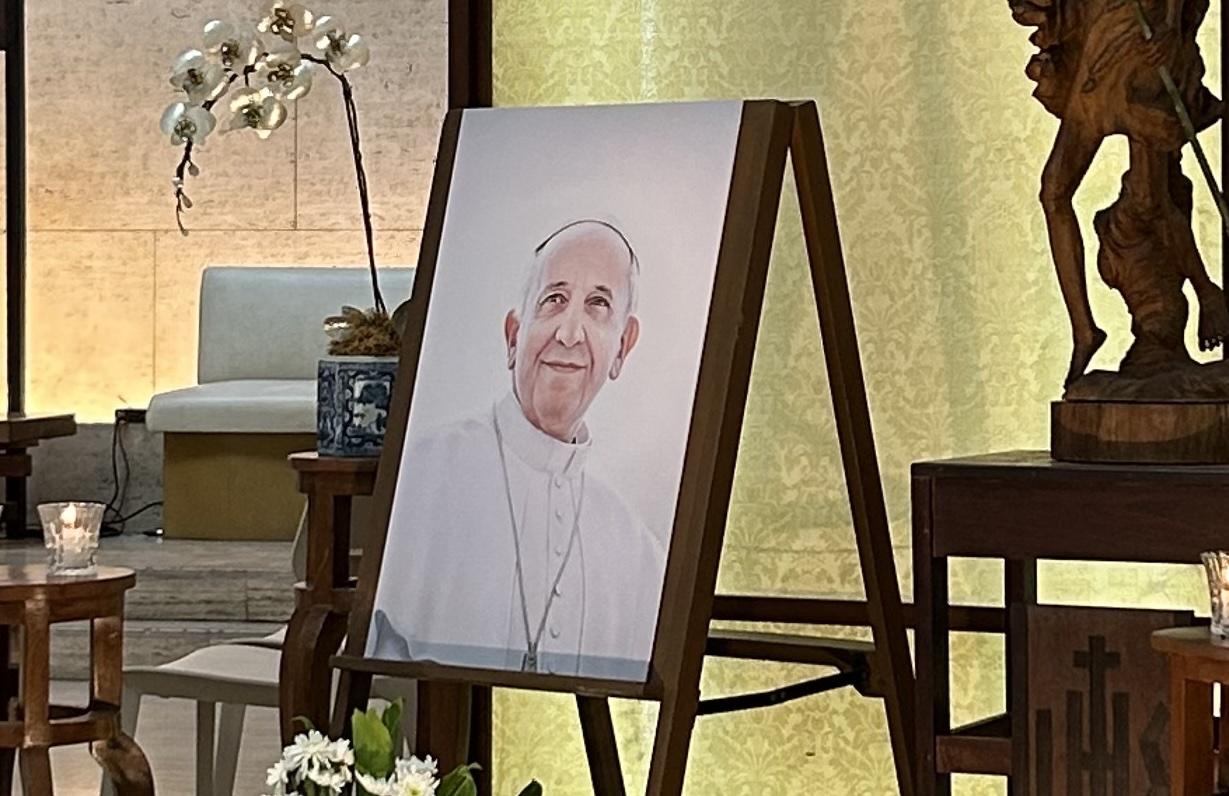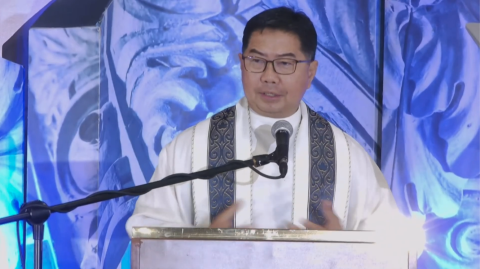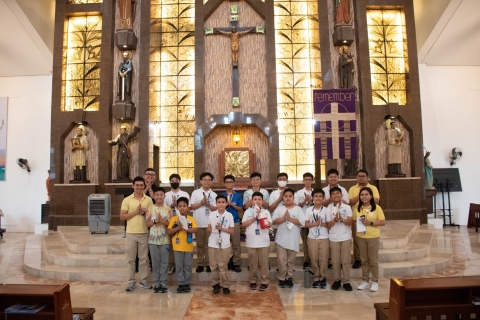Pope Francis: Our Pope and Brother
26 Apr 2025 | Fr Joel Tabora SJ
Homily by Fr Joel Tabora SJ during the Requiem Mass of Pope Francis at the Church of the Gesu on Friday, 25 April 2025.
Friday of the Octave of Easter
(Acts 4:1–12; John 21:1–14)
We have come together on the invitation of Fr Provincial to mourn the passing of our Pope—Francis, the Bishop of Rome, the universal pastor—and to honor him as our Jesuit brother in this least Society of Jesus.
Our mourning is real. We saw the signs—his difficulty walking, his frailty, his wheelchair, his struggle to breathe—but today we still feel his death came too soon. Just days ago, we saw him from the loggia of St Peter’s Basilica in Rome delivering his Urbi et Orbi blessing. His voice was frail, his blessing hand weak. His message was read for him. But it still spoke the strength of his heart and the power of the Spirit: “Jesus, who was crucified, is not here, he has risen... Love has triumphed over hatred; light over darkness, and truth over falsehood. Forgiveness has triumphed over revenge. Evil has not disappeared... but it no longer has the upper hand.”
Francis was bearing witness to the Resurrection in earthly time, even as death drew near. In today’s Gospel, we hear that the Risen Lord stood on the shore, and “the disciples did not realize that it was Jesus” (Jn 21:4). Sometimes grief or frustration or anxiety obscures our sight. But Jesus is near. Francis believed this—proclaimed it. His papacy was a long homily on that Easter shoreline, with Jesus calling out to us with familiar love: “Children, have you caught anything to eat?” (Jn 21:5) and then Jesus intervening to wake us up to his provident presence: “Cast your net over the right side of your boat and you will find something” (Jn 21:8).
We mourn the man who, as Father General Arturo Sosa noted in his letter upon his passing, lived the Petrine ministry as a Jesuit—formed in our charism, shaped by our way of proceeding. We mourn a brother who never stopped being one of us, even as he carried the burden of Peter.
His heart bore the wounds of the world. In his final Urbi et Orbi message, he pleaded for peace in Gaza, Ukraine, Myanmar—especially after the horrible earthquake in Sagaing, which caused the death and suffering of so many thousands, among them orphans and elderly. He lamented the climate of hatred, the weaponization of fear, and the isolation born of indifference. Yet even in lament, he never despaired. He saw hope in the Risen One.
As Peter proclaims in today’s reading from Acts, “There is no salvation through anyone else… for there is no other name under heaven… by which we are to be saved” (Acts 4:12). Francis kept returning us to that name: Jesus. In his teachings, he lifted up the crucified of today and invited us to intimacy with Christ by drawing near to them.
We give thanks. We are profoundly grateful. They called him the People’s Pope. But we might—each one of us—also say: he was my Pope. His words comforted me. Challenged me. Confused me. Disrupted my de more. Disturbed my daily routine. Called me to see the wounded person along the roadside. To stop. To bend down. To respond. To do something.
From the beginning of his papacy, Francis invited us to a renewed encounter with the living Christ: “No one should think this invitation is not meant for him or her,” he wrote. “The joy of the Gospel is for all people: no one is excluded” (EG, 3).
He diagnosed the spiritual sickness of our time with uncommon clarity: “the desolation and anguish of a complacent yet covetous heart, the feverish pursuit of frivolous pleasures, and a blunted conscience… no room for others, no place for the poor. God’s voice is no longer heard, the quiet joy of his love is no longer felt, and the desire to do good fades” (EG, 2). I heard that, not as an abstract social critique, but as a searing call to personal conversion.
Francis moved us beyond our comfort zones: calling us to the peripheries, to encounter those who are different, wounded, unseen. His joint 2019 Document on Human Fraternity with the Grand Imam Ahmed el-Tayeb of al-Azahr opened new paths for interreligious dialogue and peace, especially important for us in Mindanao. Fratelli Tutti and Laudato Si’ deepened our sense of universal solidarity—not just with fellow human beings, but with all fellow creatures, with Brother Sun and Sister Moon, with creation itself. He reminded us of our common home, our common destiny, and our shared vocation to care, to reconcile, to hope.
In the spirit of fraternity and dialogue, Francis called the whole Church into a new way of walking together. His vision of a synodal Church—listening, discerning, journeying together—was not a program but a path of personal conversion and ecclesial transformation. For him, synodality was how the Church becomes more like Christ: more open, humble, attentive to the voices of the poor and the Spirit. He insisted that true reform is rooted in communion, participation, and mission.
We Resolve to Continue the Mission. Francis was not only our Pope and brother. He was also our model in mission. When he came to the Philippines in 2015 he met with a representative group of Jesuits. We asked him to whom we owe special obedience in matters of mission, “Holy Father, what do you want us to do?” He answered simply: “Go to the peripheries.”
Times have changed. But that mission has not. No matter how we in our “desolation and anguish” and complacency may resist the shadows of the peripheries for the limelight of centerstage.
Father General reminds us of Francis’ deep insistence on the first of our Universal Apostolic Preferences: “to show the way to God through the Spiritual Exercises and discernment.” Francis believed that without a personal relationship with the Lord, nurtured by prayer and rooted in the Cross, our other apostolic preferences would bear no lasting fruit.
He called us to be “servants of the joy of the Gospel,” wherever we are sent. He asked us to live our obedience from this joy, to be close to the poor, to be ecclesial and inculturated, to serve without worldly ambition. He wanted our joy to be contagious.
We Hope. In this Easter Octave, we grieve—but not as those without hope. The Risen Lord who stood on the shore that morning by the Sea of Tiberias still stands near. We may not always recognize him at first, but he is here, guiding our nets, preparing our meal, warming our hearts, challenging our love, giving us joy.
Inspired by Francis—our Pope, our brother—we press on. As Peter said, “There is no other name” but Jesus. And like the disciples in the Gospel, once our eyes are opened, we too can cry out with love: “It is the Lord!”
May we, in the spirit of Francis, continue the mission with joy. May we go to the peripheries, continue the dialogue for peace, not neglect Myanmar, draw close to the crucified, walk with the poor, pray with sincerity, and proclaim by the joy of our lives that the Lord is risen indeed.
Amen.




